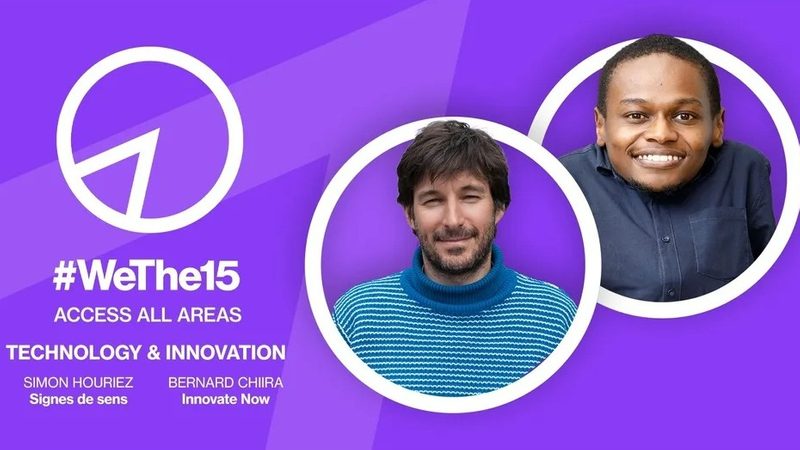
Ⓒ WeThe15, A purple graphic with white border and WeThe15 logo. It shows pictures of two men inside two seperate circles. It reads '#WeThe15 Access All Areas, Technology & Innovation, Simon Houriez, Signes de sens, & Bernard Chiira, Innovate Now.'
The need for universal design, greater access to assistive technology, and the necessity to increase the number of persons with disabilities in design are just some of the themes explored in the second episode of the WeThe15: Access All Areas podcast which focuses on technology and innovation.
Hosted by broadcaster Andy Stevenson, the episode features Signes de sens founder Simon Houriez and Global Disability Hub’s Innovate Now Africa Director, Bernard Chiira.
In the episode, Houriez recounts how his experience developing Ben Le Koala to teach children with autism simple tasks led to a greater appreciation for universal design. On the first day the app was launched it had 800 downloads, while it had only been tested with 20 families.
“We did not make any communications. And all 800 downloads were people with no connection to disability. They were just parents looking for something to help their kids to learn to brush their teeth. We had more than 350,000 downloads through the years, and I think there's maybe 6% of people with autism in the global part [using it].”
As a result, Signes de sens went from designing for accessibility to universal and inclusive design to meet the needs of different user groups. This has been the key to its success.
According to Houriez: “I think one of the key points … to change how things happen, is to make design more accessible to people with disabilities. If you have design schools, they should be able to welcome people with disabilities to be trained as designers, to be trained as innovators, then you can have people with disabilities invent new stuff, etc… Innovation is a way of thinking, a way of doing, you have to train and these schools need to be more accessible to make inclusive innovation just more common.”
Recounting his experience working in Kenya, Chiira pointed out that users do not have many options or access to a lot of assistive technology (AT) in Africa. As a result, they are denied a great product experience. To counter this, the GDI Hub and Innovate Now Africa help startups think about AT as a product that will be used by customers rather than users experiencing products from a medical or clinical perspective.
Set up in 2019, Innovate Now has supported 45 startups and has a community of over 100 entrepreneurs from 11 African countries helping shift the mindset, the markets, and everything else around assistive technology so that it can really work for those who need it.
Chiira highlights: “In countries like Kenya and many other African countries, the legacy of access to assistive technology is one of charity, right? So people get assistive technology through donations and we all know that even though donors and people of goodwill donate from a good heart, we know they are not experts in checking what am I actually giving? Is it going to do harm or not?
“And we've seen donations that actually do more harm than good because it wasn't the right product, it wasn't of the right quality, and you have this cycle going on and on. It's created this culture where people actually don't know they deserve a great product experience and it's their right. People just accept anything because it's being given.
“And so we have companies that are trying to change that narrative and say, actually free is not really free because you're also accepting sub-standard products.”
For the full episode, subscribe and listen to the series here.